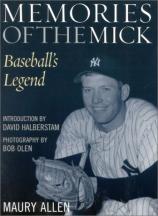Memories of the Mick: Baseball’s Legend
Review
Memories of the Mick: Baseball’s Legend
For Americans of a certain age, Mickey Mantle was the epitome of
the baby boomer hero in the days between World War Two and
America's involvement in Vietnam.
Forget, for a moment, the problems with alcoholism or the
infidelities. Mantle, with his handsome features, athletic ability,
and winning smile, embodied a youthful exuberance admired by all.
The dozens of photos in MEMORIES portray a confidant, happy
man/child, basking in the adulation of an entire nation. At one
point, he was the most famous man in America; his closest rival was
Elvis.
Maury Allen, one of New York's preeminent sportswriters of Mantle's
era, originally published this glowing biography shortly after the
superstar passed away in 1995. So the story is complete, from the
first days in the big leagues for a shy 19-year-old who had never
been away from his home in rural Oklahoma, to the ascension of the
throne left by Joe DiMaggio, to his retirement in 1969.
That Mantle was more of a tragic hero just added to his mythos. As
good as he was, he could have been better. Ironically, it was the
Yankee Clipper who had an inadvertent hand in preventing Mantle
from fulfilling his destiny. In the 1951 World Series against the
New York Giants (and another rookie named Willie Mays), Mantle
pulled up short to allow DiMaggio to field a fly ball. In doing so,
he caught his leg in a drain and essentially ruined his knee. Who
knows what he might have accomplished on two healthy legs? One can
easily imagine his problems with booze were exacerbated by the
depressions caused by his physical and mental anguish at never
quite living up to expectations.
Another argument for Mantle's drinking: The men in his family died
young, often before 40. No doubt this knowledge played a part in
his self-destructive tendencies. Might as well enjoy yourself while
you're here was his philosophy. Once he attained middle age,
however, Mantle jokingly lamented, "If I knew I was going to live
this long, I would have taken better care of myself."
An athlete's professional life is brief and he must live years
after the cheering stops. With baseball out of his life, Mantle
floundered. Weighed against today's astronomical salaries, Mantle
was a bush-leaguer; he never made more than $100,000 per season. He
made a few unfortunate business ventures and could never quite
relax in retirement. He shunned returning to the field as a coach
because he didn't want to be the story, to take attention away from
the Yankees. So he sank deeper into the bottle.
In 1993, following several years of erratic health, Mantle checked
into the Betty Ford Clinic. He came out a changed man.
Unfortunately, by that time he was dying of liver failure. His
fight against the disease drew national attention as he helped
increase awareness of organ donor campaigns. The fact that he owned
up to his shortcomings, that he sought help and asked forgiveness
from those he had hurt --- his immediate family, consisting of his
wife Merlyn and the larger "family" of Yankee and baseball fans ---
endeared him like a prodigal son. In effect, he enjoyed a
resurrection of sorts. When he passed away, his funeral received
media coverage the likes of which are usually reserved for royalty
and heads of state.
Instead of "Where have you gone, Joe DiMaggio," a song might one
day be written to honor the Mick and the influence he had on
generations of Americans.
Reviewed by Ron Kaplan (RonKaplanNJ@comcast.net) on January 22, 2011
Memories of the Mick: Baseball’s Legend
- Publication Date: March 18, 2002
- Genres: Biography, Nonfiction
- Paperback: 192 pages
- Publisher: Taylor Trade Publishing
- ISBN-10: 087833145X
- ISBN-13: 9780878331451




